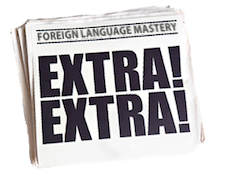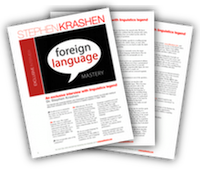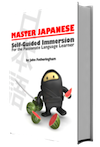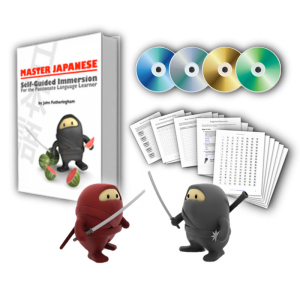Guest Post by Antonio Graceffo.
When I started my Vietnamese intensive course, a lot of non-linguistists I talked to said that the Chinese students would have an advantage because they already speak a tonal language.
It is true that some Westerners could be completely stumped by tones, and just not get the language at all. But, a person who already speaks a tonal language does not have an advantage over a Westerner or a Korean or Japanese who is intelligent, motivated and who is trying to learn tones. Remember that a Cantonese or Mandarin speaker has mastered the tones of his or her language, not the tones of Vietnamese. Saying that someone from a tonal language would have an advantage is like saying people from languages with words, or sounds, or verbs or adjectives would have an advantage.
Mastery of a particular language is based EXCLUSIVELY on your mastery of THAT language, not other languages. If you know tones in one language, you still need to learn the specific tones for the new language you are studying.
Next, people who were more language-savvy suggested that both the Chinese and Korean students would have a huge advantage because of all of the Chinese cognates between Chinese, Korean and Vietnamese. But in my class, I have noticed the Chinese and Koreans don’t even hear or notice the cognates. I help Schwe Son translate his homework every single day and he never sees the cognates. The Koreans are the same.
In addition to not having a particular advantage, our Chinese classmate, Schwe Son (not his real name) seems to have a number of special problems because of his Chinese mother tongue. For example, we learned the words for “half a million.” But in Chinese, there is no word for a million. They count by ten-thousands. So, a million is 100-ten-thousands. Schwe Son pointed at the Vietnamese words for half a million, nửa triệu, and asked me to translate. I translated it into Chinese, literally, “Half of 100-ten-thousands.” The look on Schwe Son’s face was as if he had just seen me defecate in a frying pan. “Why don’t they just say 50-ten-thousands?” He asked. He had a point.
The old Vietnamese word for Burma is ‘Miến Điện’ the same as in Chinese. But now the Vietnamese have created a Vietnamese spelling for the countries new name of Myanmar. Most languages and most countries move toward not changing country or city names, but just spelling them in their own language. This is why Beijing is now Beijing in English, instead of Peking. But Chinese cannot move in that direction, as it is impossible to spell foreign words with Chinese characters. As a result, many Chinese place names are outdated. Or, they have to create a totally new word, which may or may not be recognizable as the place it relates to.
So, in class, when we encounter country names that are instantly recognizable for Western or Korean students, but for which Schwe Son needs a translation. Afterwards, the translation has no real meaning for him. He just has to memorize it, although it doesn’t relate to anything.
We have only had eight days of class so far, but have already encountered a lot of Chinese cognates. The word for ‘a shop’ which I learned in Hanoi was ‘cửa hàng’. But here in Saigon they say ‘tiệm.’ this is a cognate from the Chinese, ‘Diàn’. And yet, when we came to this word, Schwe Son asked me to translate. I said, in Chinese, “tiệm means Diàn.” Schwe Son simply said, “OK.” And immediately wrote the Chinese character in his notebook. There was not even a flicker of recognition.
Here is a list of Chinese cognates from the first eight days of class (I have only listed modern Mandarim cognates. If I were to list ancient Chinese cognates (similar to Korean and Cantonese cognates) the list would be much, much longer.)
| English |
Vietnamese Pronunciation |
Chinese Pronunciation |
Chinese Character |
| Please |
xin |
Qǐng |
請 |
| Shop (n) |
tiệm |
Diàn |
店 |
| South |
nam |
Nán |
南 |
| East |
đông |
Dōng |
東 |
| come |
đi lại |
Lái |
來 |
| Zero/Empty |
Không (zero) |
Kōng (empty) |
空 |
| zero |
linh |
Líng |
零 |
| prepare |
Zhǔnbèi |
chuẩn bị |
準備 |
| money |
tiền |
Qián |
錢 |
| side |
bên |
biān |
邊 |
| Café |
quán cà phê |
Kāfēi guǎn |
咖啡館 |
| wrap |
bao |
Bāo |
包 |
| pronunciation |
phát âm |
Fāyīn |
發音 |
| dictionary |
tự điển |
Zìdiǎn |
字典 |
| Burma |
Miến Điện |
Miǎndiàn |
緬甸 |
| Country |
Quốc gia |
Guójiā |
國家 |
| Germany |
Đức |
Déguó |
德國 |
Vietnamese is a Mon-Khmer language, in spite of having so many Chinese cognates. Chinese is a single syllable language, with a lot of compound words. But Mon Khmer languages have multi-sylabic words. The Chinese student is having a lot of difficulty with the pronunciation of multi-sylabic words.
Possession in Khmer, Vietnamese, and English can me made, using the verb, “to belong to”, as in, ‘the book belongs to me.’ But most languages don’t have that construction. Neither Korean nor Chinese has it. (It exists in Korean, but no one uses it). So, they were all having a hard time understanding the concept of, “book belongs to me”, “sách của tôi”. The Chinese student kept pushing me for word-for-word translations. But obviously, there was no way to translate this word-for-word. I could only translate the meaning. In Chinese, “This is my book.” But then he would flip the book to the previous day’s lesson. “I thought this phrase meant ‘this book is mine’.” He said. “Yes,” I said. “The meaning is the same, but the wording is different.” “OK, so what is it in Chinese?” he asked again.
Schwe Son realizes he needs to improve his English in order to get through his study of Vietnamese language. So, every day, in addition to translating his homework into Chinese, he asks me to translate it into English for him. And this creates a whole other set of problems.
In Vietnamese there is a word for the noun, “a question” (câu hỏi), and the verb “to ask” (hỏi) is a related word. The noun, “answer” (câu trả lời) is also related to the verb “to answer” (trả lời). But in English, obviously, the verb “to ask” is unrelated to the noun “a question.”
“Open and close your book” in Vietnamese is exactly as it is in English. Meaning the same words “open and close” could be used for the door or a drawer or a crematorium. But in Chinese, the words for “open and close your book” are unrelated to “open and close the door.” I translated for him, and he understood what the phrase ‘open your book meant’ in Chinese, but it was a completely unrelated phrase, that had no meaning and no connection to anything else for him. For the rest of the classmates, once they learned ‘open and close’ they could apply it to anything. But for Schwe Son it was one isolated piece of linguistic noise.
There are so many aspects to learning a language: vocabulary, grammar, pronunciation, usage, and many more. Though an argument could be made that a student with a given native tongue may have an advantage in one area, he or she may have other areas with particular difficulties.




 25% off Master Japanese: Self-Guided Immersion for the Passionate Language Learner.
25% off Master Japanese: Self-Guided Immersion for the Passionate Language Learner.
